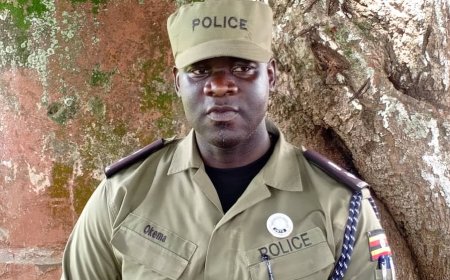From Smoke to Sustainability: Lira City Ignites Uganda’s Clean Cooking Revolution
The Lango Sub-region, once thick with indigenous forest, now faces an ecological crisis. Over two decades of deforestation driven by population growth, urbanization, and the long-term impacts of the Lord’s Resistance Army (LRA) conflict have left the land bare

By Hillary Opio Omara and Joseph Okul
In bold step toward a cleaner, healthier, and more energy-secure future, Lira City has become the latest hub to champion Uganda’s national campaign for clean cooking.
The landmark stakeholder engagement, held on Tuesday at the Lira City Council Hall, brought together government officials, energy experts, school administrators, and community leaders to accelerate the shift from traditional biomass fuels to modern cooking technologies.
The campaign, spearheaded by the Ministry of Energy and Mineral Development through the National Renewable Energy Platform (NREP), received strong backing from development partners including UKaid, the Uganda National Alliance on Clean Cooking (UNACC), and Modern Energy Cooking Services (MECS).
This initiative forms part of Uganda’s national commitment to phase out firewood and charcoal by 2030, with an interim goal of reducing reliance on biomass from over 80% in 2020 to 50% by 2025.
The engagement in Lira comes at a critical moment when Uganda’s forests, health, and economy are being ravaged by the unsustainable use of wood fuel.
Speaking at the event, Maria Kizza, a senior official from NREP, revealed that 88% of Ugandans still cook using biomass, while a mere 2% use electricity and 10% rely on fossil fuels like kerosene and LPG.
Even more alarming, she noted, is that Uganda's annual demand for wood fuel and charcoal stands at 53 million tonnes double the sustainable supply of just 26 million tonnes.
“This overconsumption is fueling deforestation, accelerating climate change, and exposing millions especially women and children to toxic indoor smoke. This is not just an energy issue. It’s a public health emergency", Kizza warned.
To combat these challenges, speakers at the event showcased electric pressure cooking, also known as e-cooking, as a transformative, clean solution.
Devices such as the EKOPOT 6L 1000W pressure cooker were displayed, illustrating their potential to significantly reduce cooking time, costs, and carbon emissions.
“With just UGX 400 half a unit of electricity, a family can prepare a full meal using an electric pressure cooker. It’s cost-effective, smoke-free, and drastically reduces fuel dependency.” Kizza explained.
The campaign aims to drive this transformation through awareness-raising, subsidies, infrastructure development, and strong institutional role-modeling.
In a symbolic gesture to inspire public confidence and accountability, electric pressure cookers were handed over to key Lira City officials, including the Resident City Commissioner, Mayor, Town Clerk, City Environment Officer, and Police PRO.
Vincent Okurut, the Lira City Town Clerk, issued a call to action emphasising that each citizen must take personal responsibility for restoring forests and improving health noting that this campaign is not just timely but rather essential.
Okurut blamed frequent droughts, erratic rainfall, and heatwaves in the Lango Sub-region on the environmental degradation caused by wood fuel extraction. He stressed that clean cooking must be central to Uganda’s fight against climate change.
The Lango Sub-region, once thick with indigenous forest, now faces an ecological crisis. Over two decades of deforestation driven by population growth, urbanization, and the long-term impacts of the Lord’s Resistance Army (LRA) conflict have left the land bare.
Leonard Otika, Lira’s City Environment Officer and focal person for the energy transition, painted a grim picture:
Otika revealed that institutions like St. Gracious Schools, Saving Grace Nursery and Primary School, Lango College, and St. Katherine Girls Secondary School have already signaled interest in adopting clean energy alternatives such as biogas and electric cookers.
Public and private schools have become some of the largest biomass consumers in the region. Thomas Otema, Director of St. Thomas Primary School, disclosed that his institution spends UGX 4.5 million per term on firewood, sourced from western Uganda.
“The health burden on our kitchen staff is enormous. Persistent coughing, eye irritation it’s unacceptable. Switching to electricity would reduce costs and protect lives,” he emphasized.
Otema appealed for government subsidies on electric cookers and called for accelerated electrification of rural and peri-urban areas.
Despite the promise of clean cooking, Uganda’s low rural electrification rate and unstable power supply remain significant obstacles.
Okello Tom Richard, Director of Studies at Lira Police Primary School, voiced these concerns citing that many schools are eager to transition, but without reliable electricity and financial support, rural institutions will be left behind.
He urged the Ministry of Energy and its partners to promote local production of electric cookers, arguing that indigenous solutions would lower prices and spur job creation.
The Lira campaign is aligned with Uganda’s Third National Development Plan (NDP III), which outlines clear targets to reduce biomass reliance and increase access to modern energy services. It also supports international climate commitments under the Paris Agreement and the Sustainable Development Goals (SDGs).
Officials from the Ministry of Energy pledged continued investment in infrastructure, including the Electricity Connection Policy and the Rural Electrification Program, which aim to expand the national grid and lower connection costs.
Traditional leaders, religious institutions, and media outlets were called upon to amplify clean energy messaging.
With just five years left before Uganda’s 2030 biomass phase-out goal, stakeholders in Lira made it clear that urgency must now translate into action.
What's Your Reaction?
 Like
0
Like
0
 Dislike
0
Dislike
0
 Love
0
Love
0
 Funny
0
Funny
0
 Angry
0
Angry
0
 Sad
0
Sad
0
 Wow
0
Wow
0









































































